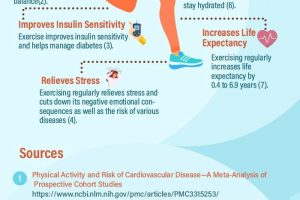The Real Benefits of Exercise for Your Overall Well-being

Exercise is not just a routine; it is a comprehensive approach to enhancing various facets of life. Whether it’s a brisk walk, a swim in the pool, or an intense gym session, physical activity encompasses a myriad of benefits often overlooked. Many people may still associate exercise purely with aesthetics, but it goes far beyond just looking good; it contributes to overall well-being.
- The Real Benefits of Exercise for Your Overall Well-being
- The Upside of Moving More
- Physical Benefits of Exercise
- Improved Cardiovascular Health
- Stronger Muscles and Bones
- Mental Benefits of Exercise
- Reduced Stress and Anxiety
- Enhanced Cognitive Function
- Emotional Benefits of Exercise
- Boosted Mood and Self-Esteem
- Better Sleep Quality
- Weight Management Benefits of Exercise
- Increased Metabolism
- Reduced Risk of Obesity
- Long-term Health Benefits of Exercise
- Lower Risk of Chronic Diseases
- Improved Immune System
- Social Benefits of Exercise
- Enhanced Social Connections
- Increased Motivation and Accountability
The Upside of Moving More
For many, exercise begins as a resolution or a necessity, perhaps to lose weight or gain strength. However, as one engages in regular physical activity, it can quickly transform into a vital, enjoyable part of their day. Picture this: after a long day at work, hitting the gym not only helps burn off stress but also enhances mood, bringing a sense of tranquility. Consider these aspects that illustrate why embracing exercise is essential:
- Immediate Health Benefits: Immediate elevation in energy levels and mood.
- Long-Term Advantages: Lower risk of chronic diseases like diabetes and heart conditions.
- Community Engagement: Joining a local sports team or fitness class fosters new friendships.
By highlighting both the immediate and long-term impacts, it becomes apparent that exercise can be a life-altering choice that greatly benefits a person’s physical, mental, emotional, and social health. As we delve further into the topic, we will explore the specific benefits of exercise in detail.
Physical Benefits of Exercise
As we dive deeper into the compelling benefits of exercise, it becomes incredibly clear that physical activity lays the foundation for a healthier body. The two critical areas we’ll explore are improved cardiovascular health and the development of stronger muscles and bones.
Improved Cardiovascular Health
Have you ever felt your heart racing during an exciting moment? That same phenomenon is what makes exercising so beneficial! Regular aerobic exercises like running, swimming, or cycling promote heart health and increase lung capacity. This means your heart becomes more efficient at pumping blood, and you enhance your overall stamina. Benefits include:
- Lower Blood Pressure: Helps maintain a healthy blood pressure level.
- Improved Cholesterol Levels: Increases good cholesterol (HDL) while lowering bad cholesterol (LDL).
- Reduced Risk of Heart Disease: Regular exercise can greatly decrease the risk of heart-related illnesses.
Stronger Muscles and Bones
Now, let’s talk about muscle and bone health. Engaging in strength training or weight-bearing exercises, such as lifting weights or yoga, not only helps you build muscle but also fortifies your bones. Some key points include:
- Increased Muscle Mass: This helps with practical daily tasks and boosts metabolism.
- Bone Density Maintenance: Weight-bearing exercises slow down the natural bone loss that occurs with age.
- Enhanced Flexibility and Balance: Vital for injury prevention as one grows older.
Incorporating these physical activities into routine leads to a more vigorous and healthier life, enabling individuals to thrive as they age. Let’s keep the momentum going and discuss the mental benefits of exercise next!
Mental Benefits of Exercise
Having explored the physical advantages of exercise, let’s shift our focus to the significant mental benefits that come along with staying active. Exercise is not only a remedy for the body but also a powerful tool for the mind, offering remarkable improvements in mental health and cognitive abilities.
Reduced Stress and Anxiety
Picture this: after a demanding day filled with deadlines and responsibilities, you step outside for a jog in the fresh air. Almost instantly, you can feel the tension dissipating. Exercise acts as a natural stress buster because it increases the production of endorphins, also known as the “feel-good” hormones. Key stress-relieving benefits include:
- Mood Elevation: Regular physical activity can significantly help reduce feelings of anxiety and depression.
- Better Coping Mechanisms: Engaging in exercise provides a constructive way to cope with stress.
- Mindfulness and Clarity: Activities such as yoga promote mindfulness, helping to clear the mental clutter.
Enhanced Cognitive Function
But the benefits don’t stop there. Exercise also contributes to enhanced cognitive function, a fundamental aspect of mental health. Engaging in regular physical activity increases blood flow to the brain, which can improve memory and learning abilities. Important cognitive advantages include:
- Improved Concentration: Boosts attention span and focus during tasks.
- Memory Enhancement: Increases neuroplasticity, aiding in information retention.
- Delayed Cognitive Decline: Regular exercise may lower the risk of age-related cognitive impairments.
With such profound influences on our mental state and cognitive abilities, it’s clear that incorporating exercise into one’s lifestyle is well worth the effort. Next, we will explore the emotional benefits of regular physical activity.
Emotional Benefits of Exercise
Following the discussion on mental advantages, let’s delve into the emotional benefits that come with regular exercise. Engaging in physical activity can significantly elevate a person’s mood and self-esteem, as well as improve sleep quality, leading to a more balanced emotional state.
Boosted Mood and Self-Esteem
Think back to the last time you finished a workout — that post-exercise adrenaline rush makes one feel accomplished and energized. This feeling stems from the endorphins released during physical activity, which naturally improve mood and foster a sense of well-being. Here’s how exercise influences emotional health:
- Natural Antidepressant: Regular workouts can be as effective as medication for some individuals in managing mild depression.
- Enhanced Body Image: As fitness improves, so does one’s perception of themselves, leading to increased confidence.
- Empowerment: Completing fitness goals, no matter how small, instills a sense of control and achievement.
Better Sleep Quality
Now, let’s consider the relationship between exercise and sleep. It’s no secret that a good night’s sleep refreshes the mind and body, but did you know that physical activity plays a crucial role in achieving this? The benefits are notable:
- Quicker Sleep Onset: Exercise helps shorten the time it takes to fall asleep.
- Deeper Sleep Stages: Inactivity often leads to restless nights, while regular movement encourages deeper, more restorative sleep cycles.
- Reduced Insomnia Symptoms: Many individuals find that exercise alleviates insomnia, leading to more consistent sleep patterns.
By bettering moods, self-esteem, and sleep quality, exercise serves as a powerful ally for emotional well-being. Next, we will look into the weight management benefits of maintaining an active lifestyle.
Weight Management Benefits of Exercise
Continuing the exploration of the myriad benefits of exercise, let’s focus on weight management. Regular physical activity not only helps individuals shed extra pounds but also establishes a sturdy framework for maintaining a healthy weight.
Increased Metabolism
A common misconception is that your metabolism is solely determined by genetics, yet exercise plays a substantial role in amping it up. When you engage in physical activity, your body’s energy requirements increase, leading to a higher metabolic rate. Consider the following:
- Muscle Mass Boost: Strength training increases muscle mass, which burns more calories at rest compared to fat.
- Post-Workout Burn: High-Intensity Interval Training (HIIT) can elevate your metabolism even after the workout is over, a phenomenon known as excess post-exercise oxygen consumption (EPOC).
- Consistent Activity: Regular activity keeps the metabolism in an optimal state, reducing the likelihood of weight gain over time.
Reduced Risk of Obesity
Accompanying the benefits of a faster metabolism is the reduced risk of obesity, a pressing health concern for many. Engaging in at least 150 minutes of moderate aerobic activity per week can have profound effects on weight control. Here’s how exercise contributes to preventing obesity:
- Caloric Deficit Maintenance: Exercise helps create a caloric deficit, essential for weight loss.
- Healthier Lifestyle Choices: Regularly exercising often motivates individuals to make healthier dietary choices as part of an overall wellness journey.
- Long-Term Weight Management: Those who exercise consistently are less likely to regain lost weight compared to sedentary individuals.
By increasing metabolism and reducing the risk of obesity, exercise proves to be an invaluable tool in the quest for a healthier life. Moving forward, let’s examine the long-term health benefits that come from a commitment to an active lifestyle.
Long-term Health Benefits of Exercise
As we continue to uncover the multitude of advantages tied to regular exercise, let’s highlight the long-term health benefits that can truly transform one’s life. Regular physical activity is not just a short-term strategy; it paves the way for a healthier future by minimizing the risk of chronic diseases and bolstering the immune system.
Lower Risk of Chronic Diseases
It’s no surprise that a sedentary lifestyle is linked to a plethora of chronic diseases such as heart disease, diabetes, and certain cancers. On the other hand, regular exercise equips the body with a robust defense against these conditions. Consider these key benefits:
- Heart Health: Regular aerobic exercise strengthens the heart muscle and helps maintain healthy blood pressure and cholesterol levels.
- Blood Sugar Control: Physical activity helps regulate insulin and glucose levels, reducing the risk of type 2 diabetes.
- Cancer Prevention: Studies indicate that engaging in 150 minutes of moderate exercise weekly can lower the risk of several cancers, including breast and colon cancer.
Improved Immune System
In addition to combating chronic diseases, exercise significantly enhances the immune system. Imagine your body as a complex machine; regular tune-ups through physical activity keep it running smoothly. Key immune system benefits include:
- Increased Circulation: Improved blood flow allows immune cells to travel throughout the body more efficiently.
- Reduced Inflammation: Regular exercise can lower levels of chronic inflammation, which is linked to various diseases.
- Enhanced Antibody Production: Physical activity boosts the production of antibodies and T-cells, which play vital roles in fighting infections.
By reducing the risk of chronic diseases and improving overall immune function, exercise emerges as a cornerstone for a long, healthy life. Next, let’s explore the social benefits that come from integrating exercise into daily routines.
Social Benefits of Exercise
As we wrap up our discussion on the diverse advantages of exercise, it’s essential to recognize the social benefits that often go hand-in-hand with physical activity. Engaging in sports or workout classes can enhance social connections and foster a sense of community, which can be incredibly fulfilling.
Enhanced Social Connections
Have you ever joined a running club or a yoga class? There’s something special about bonding with others who share similar fitness goals. Exercise offers a great avenue for building friendships and expanding social circles. Consider these social advantages:
- Shared Interests: Group activities encourage interaction with like-minded individuals, creating lasting friendships.
- Supportive Environment: Engaging in exercise with others fosters a spirit of encouragement and camaraderie.
- Networking Opportunities: Exercise classes, community runs, or local sports leagues can open doors to professional and social networks.
Increased Motivation and Accountability
While working out alone has its perks, exercising with others significantly boosts motivation and accountability. Picture this: you have a friend counting on you to show up for that early morning spin class. This camaraderie makes it harder to skip out! Key factors include:
- Commitment to Goals: Sharing fitness objectives with a workout buddy can enhance adherence to those goals.
- Team Spirit: Group workouts often introduce a competitive yet supportive atmosphere, driving everyone to push their limits.
- Feedback and Encouragement: Friends provide positive reinforcement, making the fitness journey enjoyable and fulfilling.
By fostering stronger social connections and accountability, exercise can transform into not just a personal pursuit but a communal experience that enriches lives. As we conclude, it’s clear that the benefits of exercise extend far beyond the individual, shaping healthier, happier communities.





